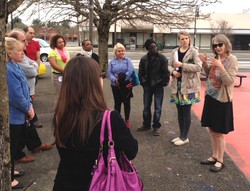The multicultural community of Rockwood, Ore., outside of Portland is at a crossroads. Residents have few options available to them for healthy food choices, jobs and health education. A light rail system transports residents to jobs and grocery store chains but offers few stops for locally owned stores and businesses. Vacant lots show promise for community gardeners but efforts to make those properties available have been slowed by red tape.
Ecumenical Ministries of Oregon and its community partners have been working to make locally grown food available to the buying public. One of the ways EMO staff plan to do that is to open a farmers market later this spring in a centralized Rockwood location.
“Many of the residents grew up in a market culture with a strong community connection and this is something people have really missed here,” says Anna Burnham, food justice coordinator for EMO. “We’ve heard there is a strong, aching desire for community space and cohesion where people can buy fresh fruit and vegetables in a safe, vibrant location.”
The farmers market will be open on Fridays from May through October, allowing local farmers and crafts vendors to bring their goods for public consumption at a time that works for everyone.
“Friday evening is good. People are leaving work for the weekend and school will be out during the summer, giving urban farmers an opportunity to connect with their neighbors,” adds Burnham. “Portland supports urban farming, so we want this to be a community grassroots-based market.”
Several vendors have already committed to take part in the market. EMO and community volunteers have been working to spread the word, saying it will be good for families who have to spend exorbitant amounts of time shopping at the food chains.
“The nearest grocery store for many Rockwood residents is at least six miles away by rail and a trip to the store can be very cumbersome,” says Burnham. “If a single parent brings small children with them, they have to struggle with the kids and carry groceries at the same time. Not the ideal situation.”
The 2012 community assessment of Rockwood found that more than half of respondents sometimes shop at a farmers market or farm stand, while more than 97 percent would like better access to healthy food in the neighborhood. The farmers market is one of many initiatives EMO is developing to meet those demands.
“If this was about making money we probably wouldn’t do it,” says Jenny Holmes, director of Environmental Ministries with EMO. “Our mission is to help farmers and provide access to affordable food. We also hope our efforts will lead to jobs. We want to provide economic opportunities that will keep people in the community.”
The Presbyterian Hunger Program Advisory Committee recently met in Portland and is one of the contributors to EMO’s efforts in Rockwood.
“If you are going to General Assembly next year in Portland, contact the Presbyterian Hunger Program to see this ‘food desert’ that is brimming with local solutions, including gardens, farmers markets, buying clubs, community kitchens, and the soon-to-be-launched, full-service food cooperative,” says Ruth Farrell, PHP coordinator. “Kudos to the Presbyterians and others working with EMO.”

